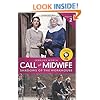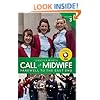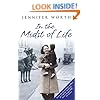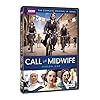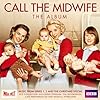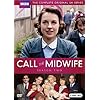
Call the Midwife: A Memoir of Birth, Joy, and Hard Times
and over one million other books are available for Amazon Kindle. Learn more


Flip to back
Flip to front


Call the Midwife: A Memoir of Birth, Joy, and Hard Times Paperback – August 29, 2012
See all 22 formats and editions
Hide other formats and editions
| Amazon Price | New from | Used from |
|
Audio CD, Audiobook, Unabridged
"Please retry"
|
$8.49 | $4.90 |

$9.04
FREE Shipping on orders over $35.
In Stock.
Ships from and sold by Amazon.com.
Gift-wrap available.
NO_CONTENT_IN_FEATURE
Start reading Call the Midwife on your Kindle in under a minute.
Don't have a Kindle? Get your Kindle here, or download a FREE Kindle Reading App.
Don't have a Kindle? Get your Kindle here, or download a FREE Kindle Reading App.
Choose Your Own Autobiography
Step right into Neil Patrick Harris's shoes in an exciting, interactive autobiography that places the reader squarely in the driver's seat. Learn more
Step right into Neil Patrick Harris's shoes in an exciting, interactive autobiography that places the reader squarely in the driver's seat. Learn more
Product Details
Would you like to update product info or give feedback on images?.
|
Editorial Reviews
From Publishers Weekly
Worth gained her midwife training in the 1950s among an Anglican order of nuns dedicated to ensuring safer childbirth for the poor living amid the Docklands slums on the East End of London. Her engaging memoir retraces those early years caring for the indigent and unfortunate during the pinched postwar era in London, when health care was nearly nonexistent, antibiotics brand-new, sanitary facilities rare, contraception unreliable and families with 13 or more children the norm. Working alongside the trained nurses and midwives of St. Raymund Nonnatus (a pseudonym she's given the place), Worth made frequent visits to the tenements that housed the dock workers and their families, often in the dead of night on her bicycle. Her well-polished anecdotes are teeming with character detail of some of the more memorable nurses she worked with, such as the six-foot-two Camilla Fortescue-Cholmeley-Browne, called Chummy, who renounced her genteel upbringing to become a nurse, or the dotty old Sister Monica Joan, who fancied cakes immoderately. Patients included Molly, only 19 and already trapped in poverty and degradation with several children and an abusive husband; Mrs. Conchita Warren, who was delivering her 24th baby; or the birdlike vagrant, Mrs. Jenkins, whose children were taken away from her when she entered the workhouse. (Apr.)
Copyright © Reed Business Information, a division of Reed Elsevier Inc. All rights reserved. --This text refers to an alternate Paperback edition.
Copyright © Reed Business Information, a division of Reed Elsevier Inc. All rights reserved. --This text refers to an alternate Paperback edition.
Review
Emulating James Herriot-except with fewer cows and more cockneys- Worth sketches a warm, amiable portrait of hands-on medical practice.
The author became a midwife at age 22, learning her trade in the 1950s from the nun midwives at the convent of St. Raymund Nonnatus and working among impoverished women in the slums of the London Docklands. Her frank, sometimes graphic memoir describes scores of births, from near-catastrophes to Christmas miracles, and details her burgeoning understanding of the world and the people in it. It's stocked with charming characters: loopy sister Monica Joan, the convent's near-mystic cake-gobbler and mischief-maker; Father Joseph Williamson, focused on delivering prostitutes rather than babies; handyman/poultry salesman/drain cleaner/toffee-apple pusher Frank; and posh Camilla Fortescue-Cholmeley-Browne ("Chummy"), an outrageously warm-hearted debutante who devoted her life to midwifery and missionary work. Worth depicts the rich variety of life in the slums, where loving, doting mothers of nine rubbed elbows with neglectful, broken young women turning tricks to support their husbands' night life. She draws back the veil usually placed over the process of birth, described here as both tribulation and triumph. In birth after birth, as women and midwives labored to bring babies into the world through hours of pain and occasional danger, Worth marveled at the mothers' almost- uniform embrace of their babies. "There must be an inbuilt system of total forgetfulness in a woman," she writes. "Some chemical or hormone that immediately enters the memory part of the brain after delivery, so that there is absolutely no recall of the agony that has gone before. If this were not so, no woman would ever have a second baby."
A charming tale of deliveries and deliverance.
-Kirkus Review
With deep professional knowledge of midwifery and an unerring eye for the details of life in the London slums of the Nineteen Fifties Jennifer Worth has painted a stunningly vivid picture of an era now passed."
-Patrick Taylor MD, author of the New York Times best seller An Irish Country Doctor.
"Readers will fall in love with The Midwife, a richly drawn chronicle of midwifery in the 1950's, in London's East end. Recounted with great tenderness and poignancy, Jennifer Worth's story is an affirmation of life during the best and worst of times, and a celebration of the relentless drama and awe-inspiring magic of birth."
-Elizabeth Brundage, author of Somebody Else's Daughter
"Jennifer Worth's memories of her years as a midwife in the East End were at once hilariously horrible and tremendously moving. She recounts a period when birth was both more frightening and more personal. Part of me wishes that my obstetrician had shown up at my house on a rickety old bicycle, and treated me both to a delivery and a hot cup of tea."
- Ayelet Waldman, author of Love and Other Impossible Pursuits
Worth gained her midwife training in the 1950s among an Anglican order of nuns dedicated to ensuring safer childbirth for the poor living amid the Docklands slums on the East End of London. Her engaging memoir retraces those early years caring for the indigent and unfortunate during the pinched postwar era in London, when health care was nearly nonexistent, antibiotics brand-new, sanitary facilities rare, contraception unreliable and families with 13 or more children the norm. Working alongside the trained nurses and midwives of St. Raymund Nonnatus (a pseudonym she's given the place), Worth made frequent visits to the tenements that housed the dock workers and their families, often in the dead of night on her bicycle. Her well-polished anecdotes are teeming with character detail of some of the more memorable nurses she worked with, such as the six- foot-two Camilla Fortescue-Cholmeley-Browne, called Chummy, who renounced her genteel upbringing to become a nurse, or the dotty old Sister Monica Joan, who fancied cakes immoderately. Patients included Molly, only 19 and already trapped in poverty and degradation with several children and an abusive husband; Mrs. Conchita Warren, who was delivering her 24th baby; or the birdlike vagrant, Mrs. Jenkins, whose children were taken away from her when she entered the workhouse.
- Publishers Weekly
--This text refers to an alternate
Paperback
edition.
The author became a midwife at age 22, learning her trade in the 1950s from the nun midwives at the convent of St. Raymund Nonnatus and working among impoverished women in the slums of the London Docklands. Her frank, sometimes graphic memoir describes scores of births, from near-catastrophes to Christmas miracles, and details her burgeoning understanding of the world and the people in it. It's stocked with charming characters: loopy sister Monica Joan, the convent's near-mystic cake-gobbler and mischief-maker; Father Joseph Williamson, focused on delivering prostitutes rather than babies; handyman/poultry salesman/drain cleaner/toffee-apple pusher Frank; and posh Camilla Fortescue-Cholmeley-Browne ("Chummy"), an outrageously warm-hearted debutante who devoted her life to midwifery and missionary work. Worth depicts the rich variety of life in the slums, where loving, doting mothers of nine rubbed elbows with neglectful, broken young women turning tricks to support their husbands' night life. She draws back the veil usually placed over the process of birth, described here as both tribulation and triumph. In birth after birth, as women and midwives labored to bring babies into the world through hours of pain and occasional danger, Worth marveled at the mothers' almost- uniform embrace of their babies. "There must be an inbuilt system of total forgetfulness in a woman," she writes. "Some chemical or hormone that immediately enters the memory part of the brain after delivery, so that there is absolutely no recall of the agony that has gone before. If this were not so, no woman would ever have a second baby."
A charming tale of deliveries and deliverance.
-Kirkus Review
With deep professional knowledge of midwifery and an unerring eye for the details of life in the London slums of the Nineteen Fifties Jennifer Worth has painted a stunningly vivid picture of an era now passed."
-Patrick Taylor MD, author of the New York Times best seller An Irish Country Doctor.
"Readers will fall in love with The Midwife, a richly drawn chronicle of midwifery in the 1950's, in London's East end. Recounted with great tenderness and poignancy, Jennifer Worth's story is an affirmation of life during the best and worst of times, and a celebration of the relentless drama and awe-inspiring magic of birth."
-Elizabeth Brundage, author of Somebody Else's Daughter
"Jennifer Worth's memories of her years as a midwife in the East End were at once hilariously horrible and tremendously moving. She recounts a period when birth was both more frightening and more personal. Part of me wishes that my obstetrician had shown up at my house on a rickety old bicycle, and treated me both to a delivery and a hot cup of tea."
- Ayelet Waldman, author of Love and Other Impossible Pursuits
Worth gained her midwife training in the 1950s among an Anglican order of nuns dedicated to ensuring safer childbirth for the poor living amid the Docklands slums on the East End of London. Her engaging memoir retraces those early years caring for the indigent and unfortunate during the pinched postwar era in London, when health care was nearly nonexistent, antibiotics brand-new, sanitary facilities rare, contraception unreliable and families with 13 or more children the norm. Working alongside the trained nurses and midwives of St. Raymund Nonnatus (a pseudonym she's given the place), Worth made frequent visits to the tenements that housed the dock workers and their families, often in the dead of night on her bicycle. Her well-polished anecdotes are teeming with character detail of some of the more memorable nurses she worked with, such as the six- foot-two Camilla Fortescue-Cholmeley-Browne, called Chummy, who renounced her genteel upbringing to become a nurse, or the dotty old Sister Monica Joan, who fancied cakes immoderately. Patients included Molly, only 19 and already trapped in poverty and degradation with several children and an abusive husband; Mrs. Conchita Warren, who was delivering her 24th baby; or the birdlike vagrant, Mrs. Jenkins, whose children were taken away from her when she entered the workhouse.
- Publishers Weekly
More About the Author
Discover books, learn about writers, read author blogs, and more.
Related Media
Customer Reviews
Most Helpful Customer Reviews
101 of 103 people found the following review helpful
By
Story Circle Book Reviews
on May 4, 2009
Format: Paperback
Comment
Sending feedback...
"Why did I ever start? Do I regret it?" Jennifer Worth asks herself in her memoir The Midwife. "Never, never, never. I wouldn't swap my job for anything on earth." Worth began her career as a midwife in the 1950s in the London Docklands.
The Docklands were poverty stricken, dirty, and recently bombed during World War II. People lived in condemned buildings among rats, grime, and violence. Worth worked out of a Nunnery, providing prenatal care, delivering babies in their homes, and checking up on the moms and babies afterward. It was a busy life with highly unpredictable hours.
One of the most memorable women in the book was Conchita Warren. Worth delivered two of her babies, numbers 24 and 25! The Warren family all lived together in a small London apartment. What was most remarkable--apart from the vast number of children--was the fact that Conchita spoke no English. Her soldier husband had met and married her in Spain and brought her home with him. "Quite suddenly, with blinding insight, the secret of their blissful marriage was revealed to me," Worth wrote. "She couldn't speak a word of English, and he couldn't speak a word of Spanish!"
Some readers may be turned off by the subject, fearing gore, blood, and other unpleasant things often associated with birth. But this is one book you don't want to judge by its cover. The Midwife is, more than anything, the story of an amazing woman in 1950s London and the people she met. I recommend this book to anyone interested in history, motivating stories, or who just wants a good read.
by Jennifer Melville
for Story Circle Book Reviews
reviewing books by, for, and about women
The Docklands were poverty stricken, dirty, and recently bombed during World War II. People lived in condemned buildings among rats, grime, and violence. Worth worked out of a Nunnery, providing prenatal care, delivering babies in their homes, and checking up on the moms and babies afterward. It was a busy life with highly unpredictable hours.
One of the most memorable women in the book was Conchita Warren. Worth delivered two of her babies, numbers 24 and 25! The Warren family all lived together in a small London apartment. What was most remarkable--apart from the vast number of children--was the fact that Conchita spoke no English. Her soldier husband had met and married her in Spain and brought her home with him. "Quite suddenly, with blinding insight, the secret of their blissful marriage was revealed to me," Worth wrote. "She couldn't speak a word of English, and he couldn't speak a word of Spanish!"
Some readers may be turned off by the subject, fearing gore, blood, and other unpleasant things often associated with birth. But this is one book you don't want to judge by its cover. The Midwife is, more than anything, the story of an amazing woman in 1950s London and the people she met. I recommend this book to anyone interested in history, motivating stories, or who just wants a good read.
by Jennifer Melville
for Story Circle Book Reviews
reviewing books by, for, and about women
Thank you for your feedback.
If this review is inappropriate, please let us know.
Sorry, we failed to record your vote. Please try again
93 of 99 people found the following review helpful
By
Julie Peterson
on July 12, 2009
Format: Paperback
Comment
Sending feedback...
When I first heard about the book THE MIDWIFE: A Memoir of Birth, Joy, and Hard Times by Jennifer Worth, I just knew I wanted to read it. I have always been fascinated by the role of midwives in our history, and I thought the idea of the author living in a convent would be interesting. too While I was thinking that I'd probably like this book, I can definitely say that THE MIDWIFE far exceeded my expectations!
This is a major aside, but it might help explain my interest in the profession of midwifery. I think women who choose midwives for their birthing option have amazing experiences. However, I have to admit that I didn't choose to go that route -- mainly because I am a major chicken and wanted an epidural. (In fact, when I was admitted to the hospital to deliver my first daughter and was asked about my pain plan, I told them DRUGS - early and often.) I find it very ironic that my daughter was actually delivered by a midwife because the doctor never made it to the delivery room in time! My husband and I agreed that the woman who delivered my daughter was a very supportive and inspirational person who made my delivery extra-special.
Since THE MIDWIFE is a memoir, I was expecting it to be all about the author Jennifer Worth. I figured that this book would include information about how the author became a midwife -- the reason behind her decision as well as lots of information on her training, etc. However, much to my surprise, this book wasn't really all about Ms. Worth. Rather, the "memoir" was filled with amazing stories about the mothers (and others) that she encountered during her years as a midwife. In addition, I was surprise by how readable this book was -- there were so many touching stories as well as humorous ones that existed within the pages of this book.Read more ›
This is a major aside, but it might help explain my interest in the profession of midwifery. I think women who choose midwives for their birthing option have amazing experiences. However, I have to admit that I didn't choose to go that route -- mainly because I am a major chicken and wanted an epidural. (In fact, when I was admitted to the hospital to deliver my first daughter and was asked about my pain plan, I told them DRUGS - early and often.) I find it very ironic that my daughter was actually delivered by a midwife because the doctor never made it to the delivery room in time! My husband and I agreed that the woman who delivered my daughter was a very supportive and inspirational person who made my delivery extra-special.
Since THE MIDWIFE is a memoir, I was expecting it to be all about the author Jennifer Worth. I figured that this book would include information about how the author became a midwife -- the reason behind her decision as well as lots of information on her training, etc. However, much to my surprise, this book wasn't really all about Ms. Worth. Rather, the "memoir" was filled with amazing stories about the mothers (and others) that she encountered during her years as a midwife. In addition, I was surprise by how readable this book was -- there were so many touching stories as well as humorous ones that existed within the pages of this book.Read more ›
Thank you for your feedback.
If this review is inappropriate, please let us know.
Sorry, we failed to record your vote. Please try again
99 of 108 people found the following review helpful
By
Amazon Customer
on September 5, 2008
Format: Paperback
Verified Purchase
4 Comments
Sending feedback...
I picked up this book in the London airport on a whim: I was pregnant and it took place in London-- a perfect souvenir. I was immediately drawn into this young midwife's story of her experiences in the poor areas of London during the 1950s. Since she wrote her memoir years later, the insight of an older woman adds a deeper layer to the book that really makes it a treasure. I lent this to my mother upon returning from our trip and haven't seen it since-- it's one of those rare books that will be passed around until it's well worn.
Thank you for your feedback.
If this review is inappropriate, please let us know.
Sorry, we failed to record your vote. Please try again
33 of 34 people found the following review helpful
By
James Denny
on August 27, 2009
Format: Paperback
Comment
Sending feedback...
Jennifer Worth's tale of her time as a midwife in the Docklands of London's East End in the 1950's reads more like a Dickensian novel from the 1850's. She explains that by the early 1960's, the East-ender Cockney culture and dockworker-dominated economy in this part of London came quietly to an end. This culture had sustained itself for more than 100 years with little change, highly insulated from outside influences.
"The Midwife: A Memoir of Birth, Joy and Hard Times" is more than a tale of delivering babies. It is a work of history and anthropology as well as a personal memoir. The chapter-by-chapter blend of all these elements is told by a woman with a keen eye to all that she saw and experienced. No detail escapes her sharp eye. Each chapter is a story unto itself. The chapters roll up to an epic tale.
Why did this culture end in the early 1960's? Worth offers up three reasons for this: loss of dockyard jobs; demolition of the tenements; and arrival of the pill resulting in much smaller family size.
Huge families were still the norm in the Docklands of the East End in the 1950's as they had been for many decades. Families typically lived in two or three-room tenements, some without running water and most without a bathroom. No one practiced birth control. Young people married young.
Many of the tenement blocks were built in the 1840's and 1850's. Those that survived World War II bombing had undergone little structural alteration in the years since. This type of living would support a modest working-class family that allowed a measure of dignity in an era still largely missing the social support systems and welfare in Britain today.Read more ›
"The Midwife: A Memoir of Birth, Joy and Hard Times" is more than a tale of delivering babies. It is a work of history and anthropology as well as a personal memoir. The chapter-by-chapter blend of all these elements is told by a woman with a keen eye to all that she saw and experienced. No detail escapes her sharp eye. Each chapter is a story unto itself. The chapters roll up to an epic tale.
Why did this culture end in the early 1960's? Worth offers up three reasons for this: loss of dockyard jobs; demolition of the tenements; and arrival of the pill resulting in much smaller family size.
Huge families were still the norm in the Docklands of the East End in the 1950's as they had been for many decades. Families typically lived in two or three-room tenements, some without running water and most without a bathroom. No one practiced birth control. Young people married young.
Many of the tenement blocks were built in the 1840's and 1850's. Those that survived World War II bombing had undergone little structural alteration in the years since. This type of living would support a modest working-class family that allowed a measure of dignity in an era still largely missing the social support systems and welfare in Britain today.Read more ›
Thank you for your feedback.
If this review is inappropriate, please let us know.
Sorry, we failed to record your vote. Please try again
